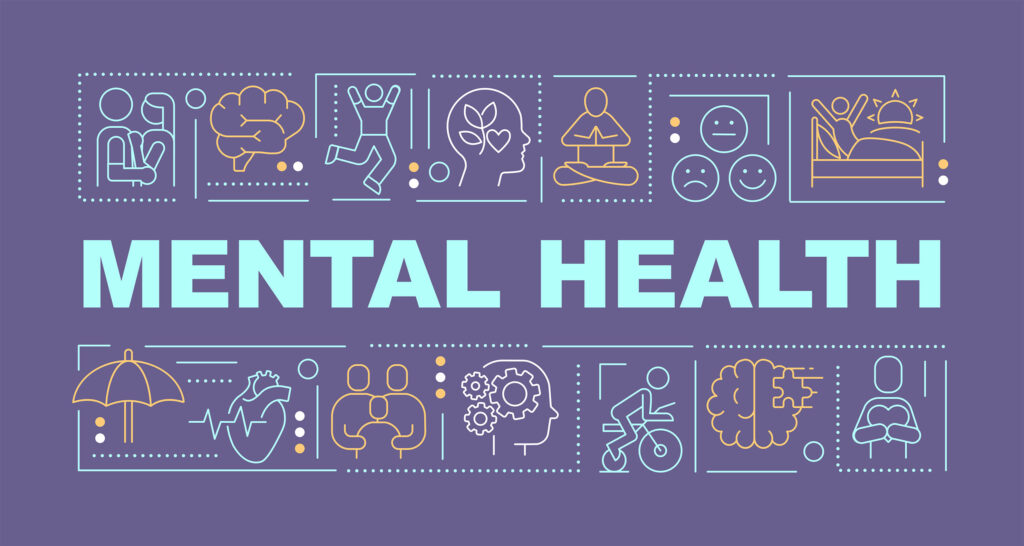Opening the Keys of Mental Health And Wellness: An Introduction of Therapy and Treatment Alternatives
Psychological wellness is a complicated and essential element of overall health. Numerous therapy and treatment choices exist to resolve various psychological challenges. Each strategy offers unique advantages and methods tailored to private demands. Recognizing these choices is essential for anybody looking for to enhance their mental health. Cognitive Behavioural Therapy. What elements should one think about when discovering these avenues? The answer may disclose a path to a healthier mood
Comprehending Mental Wellness and Its Importance
Mental health and wellness incorporates the psychological, mental, and social health of individuals, considerably influencing exactly how they believe, really feel, and act. Its value can not be overstated, as it affects every aspect of life, including partnerships, work efficiency, and total high quality of life. People with great psychological health often tend to manage anxiety much more effectively, preserve healthier connections, and make informed decisions. On the other hand, inadequate psychological health can result in psychological distress, damaged functioning, and numerous mental illness, which may require expert treatment. Understanding psychological health is crucial for acknowledging the indications of distress and the demand for assistance. Awareness additionally promotes empathy and minimizes stigma, motivating individuals to look for aid when needed. By focusing on psychological health, areas can foster atmospheres that support emotional health, eventually leading to much healthier, more resilient people. This foundation offers as an important action toward reliable mental health counseling and therapy options.
Kinds Of Therapy Strategies
Counseling approaches differ extensively, each customized to fulfill the special needs of individuals looking for assistance. Amongst one of the most usual types are cognitive-behavioral treatment (CBT), which concentrates on identifying and altering adverse idea patterns, and person-centered treatment, which stresses compassion and approval. Psychodynamic therapy checks out unconscious processes and previous experiences to recognize current behavior, while solution-focused quick treatment aims to recognize solutions instead of investigate problems.Additionally, family members treatment addresses relational dynamics and communication within families, cultivating healthier interactions. Group counseling gives a communal room for participants to share experiences and sustain one another. Other methods include existential treatment, which motivates individuals to find significance and objective, and art or music therapy, which makes use of creative expression as a therapeutic device. Each approach provides unique techniques and ideologies, permitting customers to discover one of the most suitable approach for their individual development and recovery journeys.
Discovering Various Treatment Modalities
In the domain name of psychological wellness therapy, numerous therapy methods supply distinctive strategies to therapy. Cognitive Behavioral Therapy stresses the link between behaviors and ideas, while Psychodynamic Therapy checks out subconscious impacts on psychological well-being. Additionally, Mindfulness-Based Methods promote present-moment recognition as a way to improve emotional policy and overall mental health.
Cognitive Behavioral Treatment
Cognitive Behavior Modification (CBT) attracts attention as one of the most extensively exercised and researched methods in mental health therapy. This approach concentrates on the interconnection in between thoughts, actions, and sensations, stressing that changing negative idea patterns can bring about improved emotional health and behavioral modifications. CBT is structured, usually including a restricted number of sessions, and aims to furnish people with practical abilities to handle their symptoms. It is efficient for a range of problems, including stress and anxiety problems, anxiety, and post-traumatic tension problem. By using techniques such as cognitive restructuring and direct exposure treatment, CBT fosters resilience and equips clients to face challenges head-on, making it a useful choice in the landscape of psychological health and wellness therapies.
Psychodynamic Therapy Techniques
Psychodynamic therapy strategies use a deep expedition of the subconscious mind and its impact on behavior and emotional wellness. Rooted in Freudian concept, these methods highlight the relevance of very early youth experiences and subconscious disputes. With strategies such as complimentary association, desire evaluation, and transfer, people obtain understanding into their thoughts and feelings, cultivating self-awareness and understanding. This restorative technique motivates customers to discover repressed emotions and unsolved concerns, which can be pivotal in dealing with current psychological difficulties. By analyzing the interplay in between past experiences and existing habits, psychodynamic treatment intends to promote psychological healing and personal development. Inevitably, it gives a framework for individuals to explore complicated inner characteristics that influence their mental health and wellness.

Mindfulness-Based Techniques
While typical treatments usually focus on previous experiences, mindfulness-based techniques prioritize present-moment recognition as a path to psychological health. These techniques, consisting of mindfulness-based cognitive treatment (MBCT) and mindfulness-based anxiety reduction (MBSR), urge people to engage totally with their ideas and feelings without judgment. Specialists learn to observe their psychological states, promoting a higher understanding of psychological triggers and reactions. This method not only eases symptoms of stress and anxiety and depression but also enhances overall psychological resilience. By incorporating mindfulness exercises, such as meditation and deep breathing, clients grow a feeling of tranquility and clearness. Ultimately, mindfulness-based methods encourage people to browse life's obstacles with enhanced understanding and acceptance, promoting a healthier relationship with their feelings and thoughts.
The Role of a Specialist or Counselor
A competent specialist or therapist plays a necessary function in supporting people via their psychological health trips. They provide a safe, non-judgmental area where customers can reveal their feelings and ideas freely. Mental Health Resources. By utilizing various therapeutic techniques customized per person's needs, therapists help clients check out underlying concerns that might add to their mental wellness challenges.Therapists provide guidance and devices to cope with tension, anxiety, anxiety, and other psychological troubles. Their training outfits them to recognize patterns in actions and believed processes, assisting in understandings that lead to personal growth. They likewise cultivate a strong restorative partnership, which is important for effective outcomes.Moreover, specialists stay fully commited to privacy and moral standards, guaranteeing a trusting setting. Eventually, the function of a therapist or counselor is to encourage people, encouraging them to establish durability and much healthier coping strategies while steering with life's intricacies
Just how to Select the Right Counseling or Treatment Choice
Selecting the best therapy or treatment alternative begins with assessing private requirements. It is vital to comprehend individual difficulties and objectives before discovering numerous treatment designs. This foundational action can considerably affect the efficiency of the selected approach.
Examine Your Requirements

Exactly how can individuals successfully analyze their mental health needs when evaluating therapy or therapy alternatives? They need to reflect on their psychological state and recognize details Continue issues, such as anxiousness, depression, or partnership difficulties. Journaling can be a beneficial device for tracking thoughts and feelings over time. In addition, people may take advantage of seeking feedback from relied on close friends or household members relating to regarded changes in actions or mood. It is additionally helpful to assess individual goals for treatment, such as enhancing coping abilities or obtaining understanding into individual patterns. Finally, investigating different therapy techniques and their suitability for details a knockout post requirements can help in making an informed choice. Eventually, self-awareness plays a critical role in selecting the ideal path for mental health assistance.
Check Out Therapy Designs
While traversing the diverse landscape of therapy alternatives, individuals should consider various designs of counseling to locate the ideal fit for their one-of-a-kind requirements. Cognitive Behavior Modification (CBT) concentrates on changing adverse thought patterns, while Psychodynamic Treatment checks out subconscious processes and previous experiences. Humanistic techniques emphasize personal development and self-actualization, cultivating an encouraging atmosphere. In addition, mindfulness-based treatments grow present-moment understanding, helping emotional guideline. For those seeking structure, Solution-Focused Brief Treatment targets specific goals and solutions. Team treatment provides a public setting for common experiences and support. Eventually, people ought to review their preferences, comfort levels, and details obstacles, ensuring they select a restorative design that resonates with their personal trip toward psychological well-being.
Getting Over Barriers to Looking For Aid

The Benefits of Counseling and Treatment for Mental Health
Seeking aid for mental health and wellness difficulties can bring about significant improvements in total health. Counseling and treatment supply individuals with a safe space to discover their feelings and ideas, cultivating self-awareness and personal development. These expert services equip customers with coping approaches and analytic abilities customized to their unique situations.Moreover, treatment can lower symptoms of anxiety, depression, and various other psychological wellness conditions, improving emotional strength. Routine sessions advertise liability and motivate individuals to set and achieve personal goals. With numerous healing techniques, such as cognitive-behavioral treatment or mindfulness methods, clients learn to reframe unfavorable thoughts and create healthier behaviors.Additionally, the restorative relationship itself can be a resource of assistance, aiding to deal with isolation and isolation. Generally, taking part in therapy and therapy is an aggressive action towards attaining mental health, making it possible for people to lead more meeting lives.
Frequently Asked Questions
For How Long Does Counseling or Treatment Commonly Last?
The duration of counseling or treatment varies considerably, commonly lasting from a couple of sessions to several months or years. Aspects affecting this include the individual's details needs, the kind of therapy, and therapeutic goals.
What Should I Anticipate Throughout My Very First Session?
Throughout the first session, people can expect an intro, discussion of concerns, and the specialist's method. They may finish analyses and develop objectives, promoting a secure atmosphere for open communication and structure rapport.

Exist Any Kind Of Threats Connected With Therapy?
Therapy can entail risks, such as emotional pain, vulnerability, or challenging uncomfortable memories. While these obstacles may arise, they can also result in personal development and healing, making the healing procedure complicated yet potentially fulfilling.
Exactly How Can I Tell if My Therapist Is a Great Fit?
Identifying if a therapist is a great fit involves assessing convenience, interaction style, and restorative approach. Positive rapport and development towards goals are signs of an ideal match, essential for effective mental health assistance.
Will My Insurance Coverage Cover Counseling or Therapy Procedure?
Figuring out insurance policy coverage for therapy or treatment sessions often requires getting in touch with the insurance policy supplier directly. Policies differ substantially, so people must validate benefits, co-pays, and any essential pre-approvals prior to pursuing treatment services. Amongst the most usual types are cognitive-behavioral treatment (CBT), which concentrates on recognizing and changing adverse thought patterns, and person-centered therapy, which stresses empathy and approval. Psychodynamic treatment discovers past experiences and unconscious processes to recognize existing actions, while solution-focused quick treatment intends to identify services rather than examine problems.Additionally, household therapy addresses relational characteristics and communication within families, cultivating much healthier communications. Various other strategies consist of existential treatment, which urges people to find meaning and purpose, and art or songs treatment, which uses innovative expression as a therapeutic tool. Cognitive Behavioral Treatment emphasizes the connection in between actions and ideas, while Psychodynamic Therapy checks out subconscious impacts on psychological wellness. Cognitive Behavior Therapy (CBT) concentrates on changing unfavorable thought patterns, while Psychodynamic Treatment discovers previous experiences and subconscious procedures.